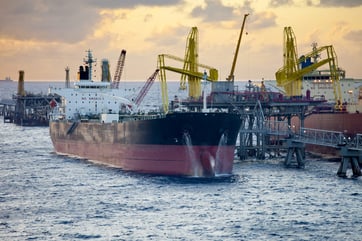Working with Quantexa to identify fraud during COVID
Perspectives / Trade commodity finance
As oil markets were hit as COVID and economies shut down, several high profile trade-related fraud cases came to the fore and resulted in many Global banks exiting the trade finance business
April 2020 – The impact of COVID on the major economies is becoming clear. During H1 2020, the vast majority of banks set aside extensive loan provisions, either due to realising losses or in anticipation of a growing crisis. Whilst some of the banks may be taking the opportunity to clean house, what is worrying to see is the overall degradation in portfolio quality, as both personal and corporate loans fall into default.
However, weakening credit quality is not the only victim of COVID. Wild swings in the markets have the habit of exposing potentially fraudulent behaviour. In amongst all of the angst and concern about employees being paid and corporates being able to meet their immediate obligations, COVID, as generally tends to be the case with a crisis, a number of potential major frauds have surfaced, one of which that could surpass $4 billion and have far-reaching implications for the oil trading and commodities market and for Singapore as a commercial hub.
Hin Leong Trading, a long-established Singaporean based giant focused on shipping fuel and physical oil. The company, established in 1963 helped facilitate massive growth in the Singaporean economy, has, apparently, run out of road. With the oil price plummeting to below zero, it became very clear, very quickly that Hin Leong had not hedged for such an event and ran out of cash. Subsequently, it has transpired that despite reporting profits of $78 million in 2019, Hin Leong had in fact been making substantial losses for a number of years and falsifying its’ accounts.
The founder of Hin Leong has since admitted that he has hidden in excess of $800 million in losses over a number of years, and following a virtual hearing on the 14th April it transpired that the company had liabilities in the region of $4.05 billion, with assets that stood at only $714 million. This gap of $3.34 billion represents a massive loss for the 23 banks, and the Q1 accounts showed that they have set aside large loss provisions to reflect losses in their recent earnings reports. Whilst the hearing and investigations are still on-going, there are concerns that $800 million is just the tip of the iceberg.
Hin Leong had, for years, been run in the shadows. Holding a dominant market position, with less than 20 shareholders, and with no independent board, the company held the status of an exempt private company, which meant that audited accounts were hidden from external scrutiny as there was no legal requirement to publish them. Hin Leong also has no official board members, and OK Lim, the founder of Hin Leong has openly admitted that he told his Finance department to hide historical losses, which, despite the firm being audited, he seems to have been able to do quite effectively, until COVID came along. The question has to be asked how a business generating in excess of $20 billion in revenues could still have operated in such an opaque manner, with little accountability, centralised and opaque governance and with limited liability for the owners and shareholders.
Hin Leong was multi banked, this is not a company that has a few credit lines with a number of banks. Hin Leong had 23 banking relationships, all of which were funding its’ activities. After seemingly exhausting credit lines in Singapore with 5 of the local banks, exposure seems to have grown across the Globe, with more and more credit being offered, by more and more banks.

A worsening situation – 20th May 2020 (Asia Times). Estimated losses have since soared to $1.14bn (up from the initial $800mn), with debts ballooning to $5.46bn, and Ocean Tankers, a subsidiary of Hin Leong run by the founders’ son, applying for creditor protection. The gap between assets and liabilities for Hin Leong now stands at $4.34bn.
In addition, Mr Lim, has now admitted that to meet margin calls, he has secretly sold off part of the million barrels of oil the company held in its’ inventory that had been used to pledge as collateral for its loans. In six months the oil inventory has fallen from $1.28 billion to $141 million. In short, not only is the company now being accused of hiding losses, manipulating annual results and poor risk management practices, creditors are now faced with growing losses as a result of the loan collateral they thought had been in place, being sold.
Contagion – In this era of a Global pandemic, the risk of contagion is not just limited to COVID19. The shock of a major player in the oil and commodities market, not only hiding losses but running out of liquidity due to a loose approach to risk management will have far-reaching consequences for oil traders and for Singapore as a whole.
Similar to the Lehman’s situation in 2009 when the U.S. Federal reserve decided to not save the bank from collapse, the collapse of a major player in an ecosystem is just the start of broader issues. Large companies with dominant positions are supported by a whole range of smaller companies, that will also be facing increased losses and greater challenges in trying to obtain credit, as the banks re-focus their lending policies and procedures for the commodity market and Singapore as a whole.
High profile examples have included:
Zenrock Commodities – $166mn
Hontop Energy – $473mn
Agritrade – $670mn
Hin Leong – $3.5bn and rising
Interested in digital acceleration?
Subscribe to NextWave for occasional email updates on the latest technology, acceleration approaches, news and NextWave events. You can unsubscribe from these communications at any time.
Subscribe for our latest updates
Tags:
Transformation
September 23, 2020
